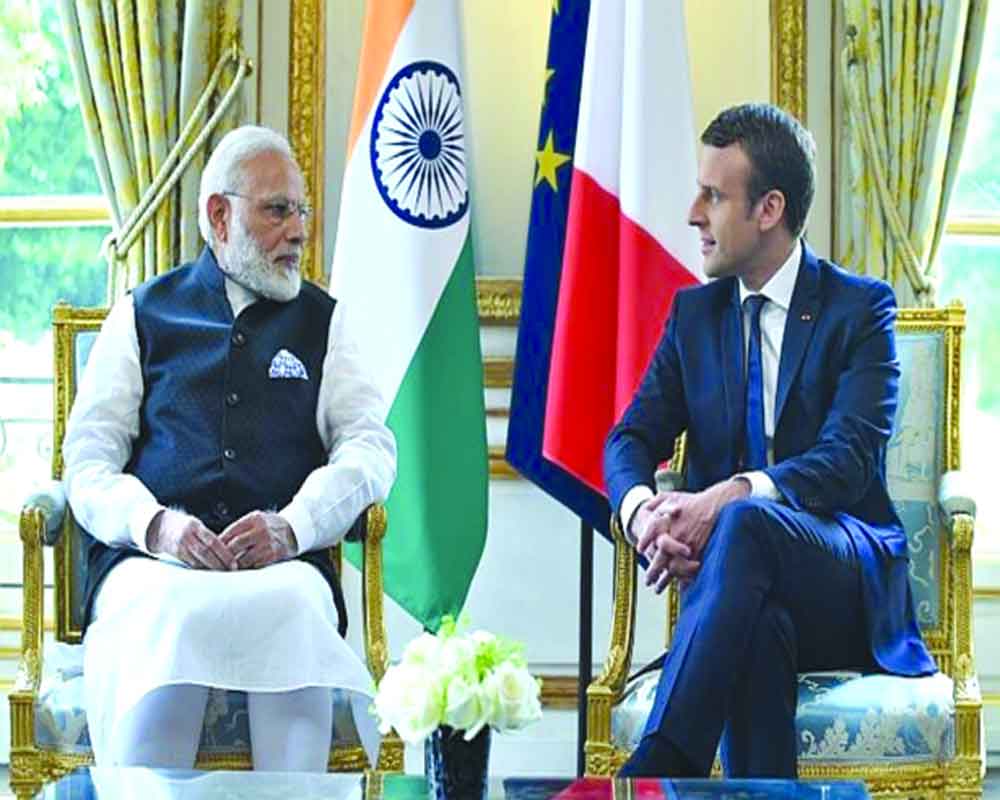The bilateral partnership must drive the shared vision for a free and fair Indo-Pacific region
France took over the European Union (EU) presidency this week for a period of six months. This development can have significant impact on QUAD and AUKUS,whose member-countries are actively seekinga dominant voice vis-a-vis China in the Indo-Pacific belt. This will also be a significant force in France's own bilateral engagements with each of the global powers and through multilateral bodies such as EU. France has a slightly altered sense of the Indo-Pacific stretching from East of Africa to the US west coast whereas for many in the QUAD group Indo Pacific is an extension the of Pacific Ocean. India, though part of QUAD, is more aligned with France's version of the Indo Pacific, which puts India in the center of the Indo-Pacific sphere of influence. France is currently facing an embarrassment in its bilateral and multilateral relationship with the US, the UK and Australia, after the down south country formed a military alliance for procuring sophisticated nuclear capability submarines patrolling the Indian ocean. This is a lost economic opportunity for France who earlier was the preferred partner for Australia to provide weaponry. This has also led to France withdrawing its diplomats from Washington in nearly 250 years and souring of relationship between the US and EU on whole bunch of multilateral issues. France and India have robust bilateral defense and security relations and have sharedinterestin global and multilateral platforms on whole bunch of issues.In the last two months of 2021, India and France have had several high-level bilateral meetings, including one between Prime Minister Narendra Modi and President Emmanuel Macron on the sidelines of G20. France has a significant presence in India's defence equipment sector, the latest being the induction of nuclear capable Rafale fighter jets into India's front end strike capabilities. In December, French armed forces minister Florence Parly had reiterated onstrengtheningindustrialcooperation and co-manufacturing ofdefenceequipment. This is a perfect fit into India's visionof self-reliance on strategic equipment production (Atmanirbhar Bharat) and France's desire to expand its economic partnership with key allies such as India in the Indo-Pacific. It is the centrality of placing India in the Indo-Pacific strategy which could be of great benefit in the next six months. Last month, the French president defined the way forward for the European Union in the Indo-Pacific with a focus on promoting multilateralism, cooperationand informationsharing onsecurity, cyber space and emerging technologies. This also includes the emerging situation in Afghanistan, and stability in Indian Ocean Rim countries where China has suddenly started to make aggressive overtures. he Chinese foreign minister Wang Yi has been on a whirlwind tour to Comoros, Kenya,Eritrea, Maldives and Sri Lanka in the Indian Ocean Region. Countering China's push for greater say in the Indianocean region is a shared interest of Indiaand France and to a large extent of the entire EU. India and EU havenot had lucrative trade relationsfor nearly a decade now, and in a post-Covid world looking to build resilient supply chains, having a rim of allies for shared prosperityis a priority. Many experts point out thatIndia may restart engagement on BTIA (Bilateral trade and investment agreement) with EU. There could be a challenge for getting the undivided attention of the French president on many of these multilateral matters on the EU platform, as he faces a stiff challenge for re-election back home. That aside, the strategic partnership should be utilized to its full potential to drive the shared vision for a free and fair Indo-Pacific region.
(The writer is a policy analyst. The views expressed are personal.)


























